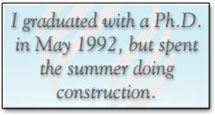
BY ROY GANE
 WAS RAISED IN THE HOME OF A SEVENTH-DAY Adventist minister. My father's father was also an Adventist minister. Thus the default position for me was to remain a Seventh-day Adventist.
WAS RAISED IN THE HOME OF A SEVENTH-DAY Adventist minister. My father's father was also an Adventist minister. Thus the default position for me was to remain a Seventh-day Adventist.
By the age of 10, and even more by the time I was baptized at age 13, I experienced the presence of Jesus Christ in my life and felt a reassuring harmony between this personal encounter and my Adventist practice and belief that had been developing since infancy. A major factor in this harmony for me was the professed adherence of the Adventist Church to the Bible, the same book that reveals Christ.
 During my years of study at the University of California at Berkeley, a period that stretched more than a decade, my relationship to God and to the Adventist Church was painfully tested. I was hurt and alienated by the way church entities treated some people who were close to me. I struggled with despair, and at times I succumbed. It all led me to distrust God and His leading. My wife and I, self-sponsored students preparing to do the work to which we believed God was calling us, were harassed by financial difficulties and an exhausting work load.
During my years of study at the University of California at Berkeley, a period that stretched more than a decade, my relationship to God and to the Adventist Church was painfully tested. I was hurt and alienated by the way church entities treated some people who were close to me. I struggled with despair, and at times I succumbed. It all led me to distrust God and His leading. My wife and I, self-sponsored students preparing to do the work to which we believed God was calling us, were harassed by financial difficulties and an exhausting work load.
In addition to all this I was struggling with a major theological issue. For about eight years I was unable to reconcile foundational elements of what I believed to be core Adventist doctrine with some apparent teachings of the Bible on the process of atonement in the Pentateuch (the first five books of the Bible), as taught convincingly by my major professor.
Resolution
It took many years, but eventually these problems all came to resolution. First of all, time brought healing perspectives with regard to the church organizations in question, as acrimonies subsided and shattered careers found redemption in other capacities.
The second thing to happen was personal. Hitting financial, physical, and emotional rock bottom following a car accident, I was led to take stock of my life. And it was this development that, paradoxically, paved the way for God to shine forth, slaying the self-dependence that had obscured "Jacob's ladder" for me.
Finally, near the end of three years of full-time dissertation research, I discovered that my professor's interpretation of the atonement in the Pentateuch had made unwarranted assumptions and had violated certain fundamental principles of ritual theory. While I was and remain an exegete rather than an apologist, I found that on the issues in question the Hebrew text pointed more than ever in the direction of the Adventist understanding.
Coming Out of the Cloud
I graduated with a Ph.D. in May 1992, but spent the summer doing construction, landscape maintenance, and telephone marketing work, with no teaching job in sight. This provided further opportunity to doubt God's leading, but after all that God had done for me by that time, I simply refused to worry. He had a place for me somewhere in His work, whether inside or outside denominational employment.
 On August 31, which happened to be my birthday, Religion Department head Gerald Winslow called to ask if I would be interested in teaching at Pacific Union College.
On August 31, which happened to be my birthday, Religion Department head Gerald Winslow called to ask if I would be interested in teaching at Pacific Union College.
I remain a Christian because I've come to trust God as real, loving, powerful. For me the strongest evidence of His existence and character has come when I've asked Him to create love in me for another person, ex nihilo. That is, to give me love for someone where none existed before. And He has done that (see Rom. 5:5).
Having learned through experience and study to believe that the Bible is God's book, I've come to accept the Adventist community of faith, with all its faults (to which I add!), as a group that belongs to God, in the sense that it attempts to follow Him and the Bible. I still have questions about some things, and do not expect to find all the answers before Christ returns (see Deut. 29:29). But the framework of what I do understand is compatible with basic Adventist teaching.
Therefore, I remain a Seventh-day Adventist. To borrow the plaintive rhetorical query of Simon Peter in John 6:68: Where else could I go?
_________________________
Roy Gane is associate professor of Hebrew Bible and Ancient Near Eastern Languages at the Seventh-day Adventist Theological Seminary at Andrews University, Berrien Springs, Michigan.

BY WILMA MCCLARTY
 HE CHURCH DEACON HAD THOUGHTFULLY prepared a spot for me to look over my notes before I was to speak one Sabbath. I was seated at the secretary's large desk outside the pastor's study, when three women came in and asked, "Have you seen our purses? We left them on this desk half an hour ago."
HE CHURCH DEACON HAD THOUGHTFULLY prepared a spot for me to look over my notes before I was to speak one Sabbath. I was seated at the secretary's large desk outside the pastor's study, when three women came in and asked, "Have you seen our purses? We left them on this desk half an hour ago."
"I'm just a visitor here, not the receptionist," I explained. "But no, I have not seen any purses, and I've been here for 15 minutes." The women panicked, looking underneath, beside, and in the drawers, but still no pocketbooks.
 Just then the helpful deacon returned, and the frantic women asked him the same question.
Just then the helpful deacon returned, and the frantic women asked him the same question.
"Yes, I have seen your purses. You left all three of them on top of the secretary's desk. So to make sure they were not stolen, I took all of them and locked them in the closet." The women were understandably relieved.
But that is not what I remember. What I'll never forget was the deacon's gentle reprimand: "You should know better than to leave pocketbooks lying around anywhere. After all, although this is a church, it is not heaven!"
Dear wise deacon, balancing the idealistic with the realistic. This is a church, but it is not heaven. A sound philosophy indeed for coping with the human imperfections of our church family.
Living on Earth
A Middle East proverb states it this way: "Trust in God--but tie your camel tight!" Even that non-Christian culture realizes the necessity of considering heavenly expectations in light of earthly realism.
How often do we expect too much of fellow believers, becoming judgmental when they don't shore up? How often do we assume fellow church members have no excuse to err, becoming critical when they make a mistake? How often do we label struggling fellow Christians as hypocrites, becoming intolerant when they fail?
 A good friend has been defined as one who sifts a pal's words, managing to keep the grain while blowing away the chaff with a breath of tolerance, keeping only the precious kernel. What a goal to strive for with our church friends especially--tolerantly blowing away the bad in each, yet managing to keep only the best.
A good friend has been defined as one who sifts a pal's words, managing to keep the grain while blowing away the chaff with a breath of tolerance, keeping only the precious kernel. What a goal to strive for with our church friends especially--tolerantly blowing away the bad in each, yet managing to keep only the best.
We should develop such tolerance for at least two reasons. In the first place, if we practice tolerance toward others, maybe they in turn will be more accepting of us when we don't measure up to their expectations. Realizing that there will be problems and problem people in the church until Jesus comes will help us to react less harshly to others' blunders--and then, by example, they to ours.
I'm reminded of some lines from a poem:
"When you get to heaven, do not stop and stare;
Others will be wondering just how you got there."
The other reason we should accept our fellow Christians unconditionally is that Jesus told us to in rather striking imagery: "Judge not, that you be not judged. For with the judgment you pronounce you will be judged, and the measure you give will be the measure you get. Why do you see the speck that is in your brother's eye, but do not notice the log that is in your own eye?" (Matt. 7:1-3, RSV).
One night I was studying my son's Sabbath school lesson with him. I spent time with him, teaching him the memory verse and getting him to say it out loud until I was certain he knew it well.
After he had said the text to my satisfaction, he looked straight at me and asked, "Do you know your memory verse, Mom?" Of course I did not.
I wish I could testify that that was the last time I have ever superintended others' behaviors before tending to my own problems first. But the temptation to be tolerant of ourselves and critical of others, particularly those in our church family, is strong.
Yes, purses can be stolen, even in the sacred walls of a sanctuary. The deacon did have it right--this is a church, but this is not heaven.
_________________________
Wilma McClarty is a professor of English and speech at Southern Adventist University in Collegedale, Tennessee.


